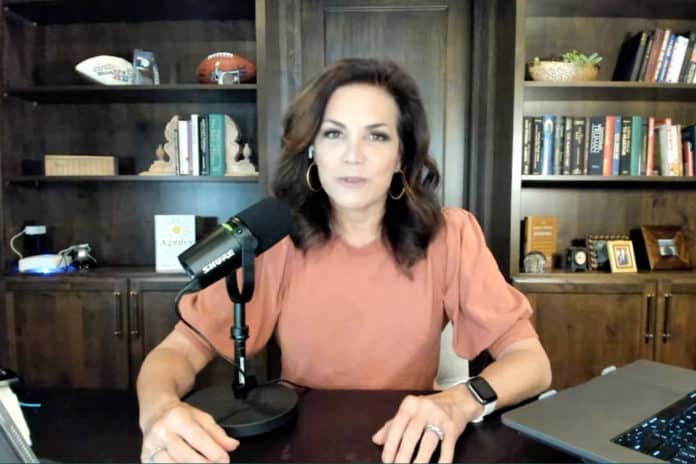
For three decades, Michele Tafoya came into our homes via national and local TV and radio as she covered college and pro sports and the Olympics. An award-winning reporter, she spent the past few years on the sidelines covering Sunday night football.
When, after the 2022 Super Bowl, Tafoya walked away from her coveted job, many assumed she was fired.
She wasn’t.
A resident of the Twin Cities, Tafoya had things to do and say that were outside the bounds of her network job. And she had a plan.
She dipped her toe in politics as the co-chair of Kendall Qualls’ gubernatorial campaign. When Qualls lost the Republican nomination to Dr. Scott Jensen, she switched her support to the Jensen/Birk ticket.
Last month she launched a podcast, Sideline Sanity, with Bob Costas as her first guest. Four days a week, with a new puppy nestled at her feet, she’s using the podcast to offer insight and perspective on life and culture she was unable to share as an NBC employee.
I first connected with Tafoya after reading an essay she penned for Substack, an online writing platform. In “Dear Middle,” Tafoya posits that Americans aren’t as divided as it seems. Though we hear a lot from those on the fringes, she wrote, most of us live in the middle, where we share common values.
She ended with a call to action: to develop a coalition of courage.
I’d been thinking about courage for months before I began writing for Alpha News. As Tafoya notes, in the current environment, there is an opportunity cost associated with speaking one’s truth when it doesn’t align with others. Consequently, many of us who present a viewpoint that is shared by some and rejected by others must engage in a cost/benefit analysis.
In Tafoya I discovered a kindred spirit.
We see the same battle lines. We share a commitment to try to embolden others to join the fight — to get involved, to vote, or to stand up for one’s principles.
We agree we have more to lose by remaining quiet than by speaking up.
We’re engaged in a battle to retain the freedom to speak our minds, to ensure our nation retains the values it was built on.
Tafoya’s a wife and mother of two who is deeply concerned about the future of our country.
She’s concerned about what kids are learning at school.
She’s concerned about the erosion of civility, be it in politics or in everyday interactions.
She lives a values-driven life. Her core values — family, integrity, security, health, and happiness — form a five-lane highway through which she navigates life.
Though integrity is vitally important to her, it’s not to everyone.
Recently, Tafoya was asked to be a guest on a three-person sports podcast to discuss her new career.
She knew it was going to be trouble when they introduced her as “the dark side.” They’d seen and heard some of her content since she’d left sports. And they weren’t fans.
Dodging her request to define the term himself, one man asked her to identify her specific objections to critical race theory. When she did, they reacted with angst and ridicule.
She could have bailed but she stuck it out. And she didn’t apologize for her views.
“It was an awful experience to have three strangers treat me like they thought they knew my soul and they thought it was dark and evil and bigoted,” she told me.
It was also an example of how people dig into their positions and throw civility to the wind.
“The fact that people think the only way they can make their point is by belittling others and coming across so aggressively is a sad state of affairs and it’s one that I don’t want to participate in,” she says.
By sharing stories of people who are also trying to elevate the conversation, she’s trying to embolden others to be brave. People want to be inspired, to know they’re not the only ones who think this way, and they want to know someone’s got their back, she says.
Being courageous doesn’t involve apologizing for principles and beliefs.
“I feel like we’ve had so much apologizing over the last five years for the most benign things because the Twitter mob has gotten to people, and they can’t take it. I feel for those people, but I want to say to them, ‘if you hold your ground and you straighten your spine and you say, I’m sorry that our values don’t align but this is who I am and I’m not going to apologize for that,’ those people would likely back down because they know they’re not going to get anywhere with you.”
While she acknowledges that words matter, she objects to the narrative that words are dangerous.
“Do you know what makes me feel unsafe? Walking in front of a speeding car; walking alone at 1 a.m. in a dangerous neighborhood.”
How do we embolden others to be brave? By telling them again and again that they’re better off if they do it this way and by offering proof, she says.
The coalition of courage is growing as more people are finding their voices. “There are a lot of brave people out there,” Tafoya says. “I meet them every day.”
















